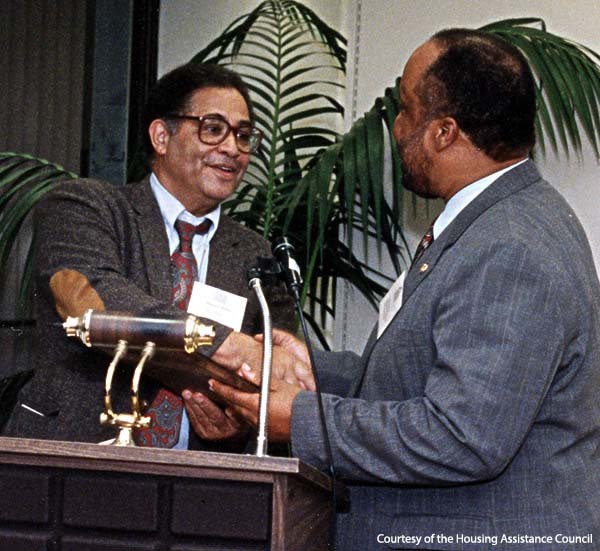Leadership Gallery
The Reverend Harry John Bowie, 1935-2006
The Reverend Harry Bowie with fellow HAC board member and Democratic chairman of the U.S. Homeland Security Committee Congressman Rep. Bennie G. Thompson. Photo courtesy of the Housing Assistance Council.
As an Episcopal priest, civil rights organizer, and low income housing advocate, Harry Bowie's vision and insight reached beyond the Episcopal Church and into the southern and rural communities of America. Bowie was born in Long Branch, New Jersey in 1935. He attended Hobart College in Geneva, New York from which he received his Bachelor of Arts in 1958; he graduated from General Theological Seminary in 1961. That same year he was ordained to the diaconate and the priesthood. From 1961 to 1964, before his full-time commitment to the advancement of civil rights and development of low income housing, he served as curate at St. John's in Camden, New York and as vicar at Church of the Annunciation in Lawnside, New Jersey.
Following his parochial ministry, Bowie joined with members of the Student Nonviolent Coordinating Committee (SNCC) to assist with voter registration efforts in McComb, Mississippi during the violent summer of 1964, which became known as Freedom Summer. As a young New Jersey minister committed to social change, his move to Mississippi afforded him the opportunity to involve himself in economic development and politics which would become his life's vocation.
From 1974 until his death in 2006, Bowie served on the Board of Directors at the Housing Assistance Council (HAC) in Washington, D.C., a national nonprofit corporation which assists local organizations in building affordable homes in rural America. His role in the struggle for civil rights and economic equality in the segregated and impoverished Mississippi Delta was recognized when he was honored with the Lifetime Achievement Award in Rural Housing by HAC in 2004.
Bowie was also involved in bringing Black leadership to the Mississippi Democratic Party in the 1970s and 1980s. While in McComb in the 1980s, he was responsible for Miter Inc., a federally funded transportation agency. During that same decade, Bowie began work as Director of the Delta Foundation in Greenville, an economic and community development corporation. He continued to serve as the Executive Director of the Delta Foundation until his retirement in 2005. Bowie also served as co-chairman of the board of the Mid-Delta Empowerment Zone Alliance.
In 1999 the U.S. Senate appointed Bowie to a three-year term as a member of the Board of Directors of the National Consumer Cooperative Bank. which provided financing to businesses in urban and rural areas. At the national Church level, he was a member of the Working Group on Economic Justice.
The Reverend Harry Bowie dedicated his life to the plight of the impoverished. Congressman Bennie Thompson (also a member of HAC's board) commented, "Harry's vision and insight for creating a better Mississippi led to significant community improvements and employment opportunities where none had existed before. Wherever there is a newly developed area or a thriving small business in the Delta, it more than likely has Harry's imprint." [Sources]


